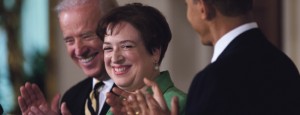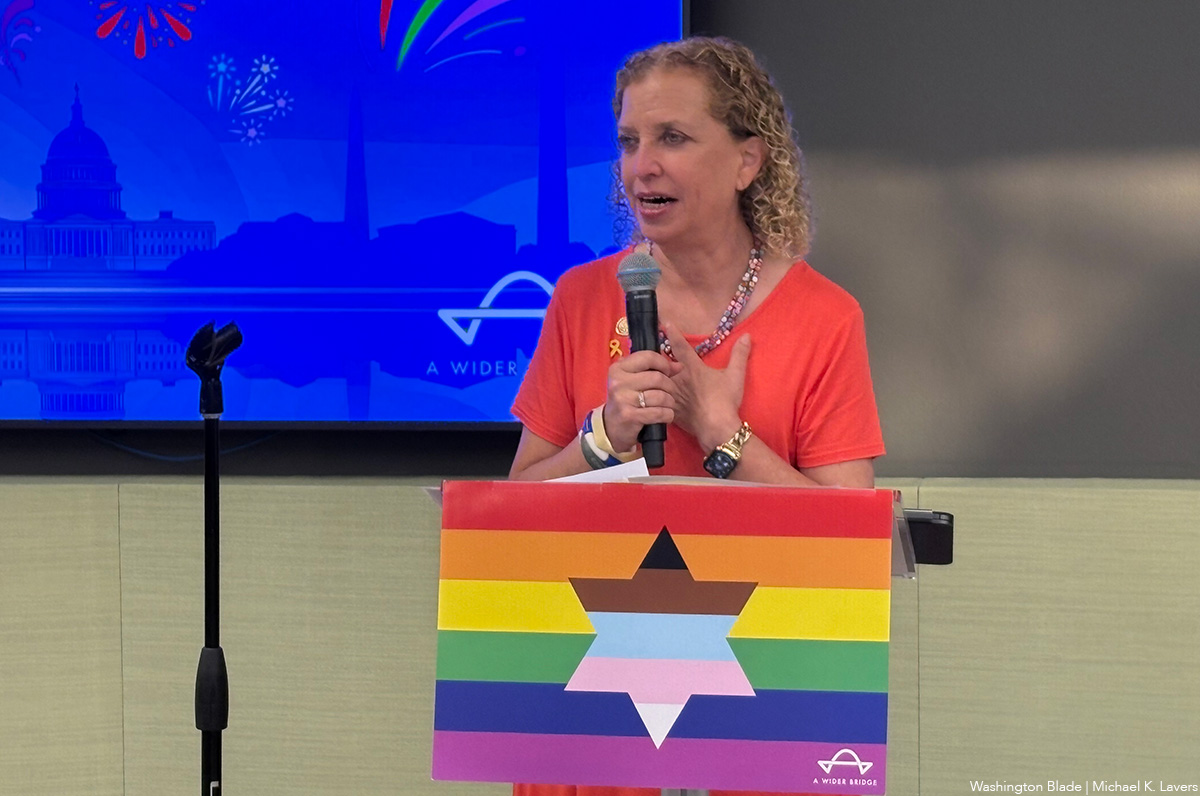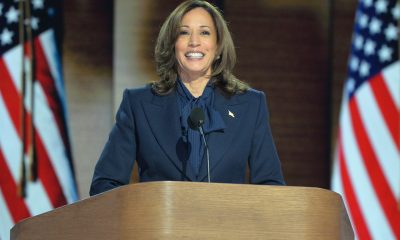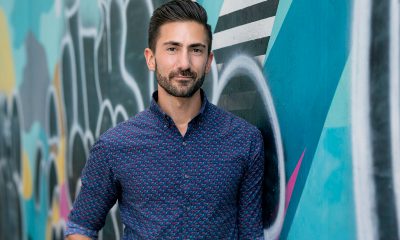National
Kagan’s record, sexual orientation draw scrutiny
LGBT groups mixed on Supreme Court nominee

Solicitor General Elena Kagan, a U.S. Supreme Court nominee, could be asked to address past comments on ‘Don’t Ask, Don’t Tell’ and same-sex marriage during her confirmation hearings. (Photo by Lawrence Jackson; courtesy of White House)
President Obama’s nomination of Solicitor General Elena Kagan to the Supreme Court is inspiring varied reactions, ranging from excitement to caution, as questions linger about her record on LGBT issues.
Many LGBT advocacy groups are pleased that Kagan opposed military recruitment on Harvard’s campus because “Don’t Ask, Don’t Tell” violates university non-discrimination policies, but others are waiting for her to clarify her positions on LGBT issues in congressional testimony before the Senate.
Meanwhile, questions about Kagan’s sexual orientation distracted attention from her record this week, as some anti-gay conservatives — along with more than a few LGBT bloggers — speculated that she is a lesbian.
Obama nominated Kagan to fill the seat that will be vacated at the end of the term by retiring Associate Justice John Paul Stevens. If the Senate confirms her to the position, there would be three women sitting on the Supreme Court, the most women the bench has seen in its history.
Prior to her tenure as solicitor general, in which she defended federal law before the Supreme Court, Kagan was a clerk for former Associate Justice Thurgood Marshall, an associate White House counsel for former President Bill Clinton and dean of Harvard law school.
In a statement, Sen. Patrick Leahy (D-Vt.), chair of the Senate Judiciary Committee, said the Senate would consider Kagan’s nomination this summer and should confirm her nomination before the August recess.
Joe Solmonese, president of the Human Rights Campaign, in a statement, praised Obama for selecting Kagan to serve on the bench.
“We applaud President Obama for choosing Elena Kagan to become our nation’s next U.S. Supreme Court Justice,” Solmonese said. “We are confident that Elena Kagan has a demonstrated understanding and commitment to protecting the liberty and equality of all Americans, including LGBT Americans.”
Doug NeJaime, a gay associate law professor at Loyola Law School, expressed similar excitement over the nomination of Kagan, whom he called a “fantastic” choice to serve on the bench.
In 2008, NeJaime said he attended a Harvard gay and lesbian caucus conference where Kagan moderated a panel with sexual orientation law scholars. He noted that Kagan “was clearly really knowledgeable about these issues.”
“I think she’ll do a good job in dealing with them and hopefully having conversations with other justices — getting them more on board with what LGBT legal issues entail,” NeJaime said.
But Hayley Gorenberg, deputy legal director for Lambda Legal, was more cautious about embracing Kagan’s nomination and said she was awaiting the Senate confirmation process.
“She’s just been nominated, and we are studying everything that we can on her,” she said. “We’re looking toward the confirmation hearings so that we can learn more about her positions on legal areas that are core to the right of LGBT people and people with HIV.”
In particular, Gorenberg said she’s looking to see whether Kagan will separate herself from the Justice Department’s legal briefs defending challenges to the Defense of Marriage Act and “Don’t Ask, Don’t Tell,” which occurred under her watch during the Obama administration.
“Those briefings give us concern, and we certainly voiced it with the Obama administration,” Gorenberg said. “So, what we need to see now is her views apart from an institutional position, and that’s what we’re looking toward in confirmation hearings.”
‘Don’t Ask’ stance
could be obstacle
One potential obstacle that Kagan may encounter on her path to confirmation — despite the favor it may win her among LGBT supporters — is her opposition as dean of Harvard law school to military recruiting on campus because of “Don’t Ask, Don’t Tell.”
In October 2003, Kagan wrote in an e-mail to students that military recruiting on campus caused her “deep distress” and that she “abhor[s] the military discriminatory recruitment policy,” according to a recent report in the Washington Post.
She was quoted as calling the recruitment policy in the U.S. military “a profound wrong — a moral injustice of the first order.”
In 2005, Kagan was also one of 40 Harvard professors who signed a friend-of-the-court brief in favor of an appellate court ruling overturning the Solomon Amendment, which would have allowed colleges to limit the military’s presence at campus recruiting events. The Supreme Court unanimously disagreed with the lower court ruling.
Conservative senators could pounce on Kagan’s views on military recruitment on campus as dean of Harvard law school as reason to vote against her confirmation.
Sen. Jeff Sessions (R-Ala.), ranking Republican on the Senate Judiciary Committee, said in a statement published shortly after her nomination that Kagan’s position is “deserving review.”
“This is a significant issue for me since I worked hard for the passage of the Solomon Amendment,” Sessions said. “Her actions in this case, along with other issues, will need to be addressed, and Ms. Kagan will be given a fair opportunity to respond.”
Sen. James Inhofe (R-Okla.) said Monday he plans to vote against Kagan’s confirmation — making him the first senator to commit to a “no” vote — because of her position on campus military recruitment.
But NeJaime said he didn’t think Kagan’s position would be problematic because it’s “very much in the mainstream of the legal academic community,” and other law schools besides Harvard have challenged the constitutionality of the Solomon Amendment in court.
“It’s not like she was even completely out in front on that issue,” NeJaime said. “I also think public sentiment against ‘Don’t Ask, Don’t Tell’ is pretty high, and so it’s not a non-mainstream position.”
But Gorenberg said Senate opposition to Kagan’s confirmation because of her position on military recruitment is already apparent.
“We can already see that the positions that she promoted as dean that were targeted against discrimination against LGBT people — that those positions are already the subject of potshots from anti-gay extremists,” Gorenberg said. “We saw that instantly upon her nomination, if not before.”
Kagan’s views on military recruitment also raise the question of whether she would be asked to recuse herself in the event a “Don’t Ask, Don’t Tell” case came before the Supreme Court while she’s on the bench.
Gorenberg said “it’s not clear” that Kagan would need to seek recusal in such a situation based on her comments as dean of Harvard law.
The Servicemembers Legal Defense Network didn’t immediately respond to the Blade’s request to comment on Kagan’s statements on military recruitment or whether she would have to recuse herself if a “Don’t Ask, Don’t Tell” case reached the high court.
Same-sex marriage
a potential issue
Another topic that may come up during Kagan’s confirmation hearings is her position on same-sex marriage and whether she thinks the U.S. Constitution provides for marriage rights for same-sex couples. Such a position would be especially important for LGBT people because cases on same-sex marriage could be on their way to the Supreme Court.
Kagan previously denied that the U.S. Constitution grants a right to same-sex marriage in a questionnaire answer prior to her confirmation hearings to become solicitor general.
“There is no federal constitutional right to same-sex marriage,” she wrote in a response to a question on the issue.
In response to a subsequent question, she added that she doesn’t believe she expressed an opinion on the question before that time.
Kagan’s response could be troubling for organizations behind federal lawsuits seeking to overturn the Defense of Marriage Act or bans on same-sex marriage within states.
The American Federation for Equal Rights, the organization behind the Perry v. Schwarzenegger case seeking to overturn California’s Proposition 8, didn’t respond to the Blade’s request to comment on the Kagan nomination.
A spokesperson for the Gay & Lesbian Advocates & Defenders — which is behind Gill v. Office of Personnel Management, a case seeking to overturn part of DOMA that prohibits federal recognition same-sex marriage — said her organization isn’t commenting on the Kagan nomination because the lawsuit could go to the Supreme Court.
On the Perry case, NeJaime said Kagan’s comment on same-sex marriage could be relevant depending on whether the court takes up the case as a broad question about constitutional rights to same-sex marriage or, more simply, California’s legitimate interest in passing Proposition 8.
“I also think we don’t really know what her position will be on an issue like that until the issue is briefed and until it’s actually at the court,” he said. “I’m pretty confident that she is at least open-minded to LGBT claims under the federal Constitution.”
Gorenberg said she’s “not sure” whether Kagan’s comments would be a predictor of how the nominee would rule if marriage cases came before the Supreme Court.
She said the remarks raise the question of what Kagan meant in her questionnaire answer, but noted that it’s unknown whether Kagan’s position would become more clear during confirmation hearings.
“We would always like to know what would happen in the future on a specific issue, but it’s not surprising to us — for any nominee — that we don’t get a specific forecast on a case because it’s just not standard that the nominees ever give them to us,” Gorenberg said.
Still another issue surrounding the nomination is whether Kagan, who’s unmarried, is a lesbian.
In a deleted CBS News posting published prior to the announcement of Kagan’s nomination, conservative blogger Ben Domenech wrote that confirmation of Kagan would make her the “first openly gay justice.”
The White House disputed Domenech’s characterization of Kagan as an out lesbian and said he was making false charges. After the posting was deleted, Domenech maintained that he heard discussion about her sexual orientation.
In a later posting on the Huffington Post, Domenech wrote that he “erroneously believed” Kagan was an out lesbian because “it had been mentioned casually on multiple occasions by friends and colleagues — including students at Harvard, Hill staffers, and in the sphere of legal academia — who know Kagan personally.”
Sessions’ office didn’t respond to the Blade’s request to comment on whether the matter was of concern to the senator or whether he would expect questions on the issue to come up during the confirmation hearings.
NeJaime said he didn’t anticipate discussions of Kagan’s sexual orientation to arise during her confirmation hearings, but said it would be “sad commentary” if the matter became a stumbling block for her.
“We don’t know about her sexual orientation one way or the other, and I don’t really anticipate it being an issue that anyone takes up,” he said.
Gorenberg said she didn’t have any information on Kagan’s sexual orientation and didn’t know how lawmakers would respond to speculation that she’s a lesbian.
“There are a lot of senators out there and I don’t know [who] may or may not be inclined to go after any nominee based on their sexual orientation,” Gorenberg said.
She said one of Lambda’s central tenets is that people shouldn’t face discrimination based on sexual orientation and noted that principle could be applied in Senate confirmation hearings.
A friend of Kagan’s told Politico this week that Kagan is not a lesbian.
“I’ve known her for most of her adult life and I know she’s straight,” Sarah Walzer, Kagan’s law school roommate, told Politico. “She dated men when we were in law school, we talked about men … She definitely dated when she was in D.C. after law school … and she just didn’t find the right person.”

A Wider Bridge on Friday announced it will shut down at the end of the month.
The group that “mobilizes the LGBTQ community to fight antisemitism and support Israel and its LGBTQ community” in a letter to supporters said financial challenges prompted the decision.
“After 15 years of building bridges between LGBTQ communities in North America and Israel, A Wider Bridge has made the difficult decision to wind down operations as of Dec. 31, 2025,” it reads.
“This decision comes after challenging financial realities despite our best efforts to secure sustainable funding. We deeply appreciate our supporters and partners who made this work possible.”
Arthur Slepian founded A Wider Bridge in 2010.
The organization in 2016 organized a reception at the National LGBTQ Task Force’s Creating Change Conference in Chicago that was to have featured to Israeli activists. More than 200 people who protested against A Wider Bridge forced the event’s cancellation.
A Wider Bridge in 2024 urged the Capital Pride Alliance and other Pride organizers to ensure Jewish people can safely participate in their events in response to an increase in antisemitic attacks after Hamas militants attacked Israel on Oct. 7, 2023.
The Jewish Telegraphic Agency reported authorities in Vermont late last year charged Ethan Felson, who was A Wider Bridge’s then-executive director, with lewd and lascivious conduct after alleged sexual misconduct against a museum employee. Rabbi Denise Eger succeeded Felson as A Wider Bridge’s interim executive director.
A Wider Bridge in June honored U.S. Rep. Debbie Wasserman Schultz (D-Fla.) at its Pride event that took place at the Capital Jewish Museum in D.C. The event took place 15 days after a gunman killed two Israeli Embassy employees — Yaron Lischinsky and Sarah Milgrim — as they were leaving an event at the museum.
“Though we are winding down, this is not a time to back down. We recognize the deep importance of our mission and work amid attacks on Jewish people and LGBTQ people – and LGBTQ Jews at the intersection,” said A Wider Bridge in its letter. “Our board members remain committed to showing up in their individual capacities to represent queer Jews across diverse spaces — and we know our partners and supporters will continue to do the same.”
Editor’s note: Washington Blade International News Editor Michael K. Lavers traveled to Israel and Palestine with A Wider Bridge in 2016.
The White House
‘Trump Rx’ plan includes sharp cuts to HIV drug prices
President made announcement on Friday

President Donald Trump met with leaders from some of the world’s largest pharmaceutical companies at the White House on Friday to announce his new “Trump Rx” plan and outline efforts to reduce medication costs for Americans.
During the roughly 47-minute meeting in the Roosevelt Room, Trump detailed his administration’s efforts to cut prescription drug prices and make medications more affordable for U.S. patients.
“Starting next year, American drug prices will come down fast, furious, and will soon be among the lowest in the developed world,” Trump said during the meeting. “For decades, Americans have been forced to pay the highest prices in the world for prescription drugs by far … We will get the lowest price of anyone in the world.”
Trump signed an executive order in May directing his administration “to do everything in its power to slash prescription drug prices for Americans while getting other countries to pay more.”
“This represents the greatest victory for patient affordability in the history of American health care, by far, and every single American will benefit,” he added.
Several pharmaceutical executives stood behind the president during the announcement, including Sanofi CEO Paul Hudson, Novartis CEO Vas Narasimhan, Genentech CEO Ashley Magargee, Boehringer Ingelheim (USA) CEO Jean-Michel Boers, Gilead Sciences CEO Dan O’Day, Bristol Myers Squibb General Counsel Cari Gallman, GSK CEO Emma Walmsley, Merck CEO Robert Davis, and Amgen Executive Vice President Peter Griffith.
Also in attendance were Health and Human Services Secretary Robert F. Kennedy Jr., Commerce Secretary Howard Lutnick, Centers for Medicare and Medicaid Services Administrator Mehmet Oz, and Food and Drug Administration Commissioner Marty Makary.
Under the Trump Rx plan, the administration outlined a series of proposed drug price changes across multiple companies and therapeutic areas. Among them were reductions for Amgen’s cholesterol-lowering drug repatha from $573 to $239; Bristol Myers Squibb’s HIV medication reyataz from $1,449 to $217; Boehringer Ingelheim’s type 2 diabetes medication jentadueto from $525 to $55; Genentech’s flu medication xofluza from $168 to $50; and Gilead Sciences’ hepatitis C medication epclusa from $24,920 to $2,425.
Additional reductions included several GSK inhalers — such as the asthma inhaler advair diskus 500/50, from $265 to $89 — Merck’s diabetes medication januvia from $330 to $100, Novartis’ multiple sclerosis medication mayzent from $9,987 to $1,137, and Sanofi’s blood thinner plavix from $756 to $16. Sanofi insulin products would also be capped at $35 per month’s supply.
These prices, however, would only be available to patients who purchase medications directly through TrumpRx. According to the program’s website, TrumpRx “connects patients directly with the best prices, increasing transparency, and cutting out costly third-party markups.”
Kennedy spoke after Trump, thanking the president for efforts to lower pharmaceutical costs in the U.S., where evidence has shown that drug prices — including both brand-name and generic medications — are nearly 2.78 times higher than prices in comparable countries. According to the Pharmaceutical Research and Manufacturers of America, roughly half of every dollar spent on brand-name drugs goes to entities that play no role in their research, development, or manufacturing.
“This is affordability in action,” Kennedy said. “We are reversing that trend and making sure that Americans can afford to get the life-saving solutions.”
Gilead CEO Dan O’Day also spoke about how the restructuring of drug costs under TrumpRx, combined with emerging technologies, could help reduce HIV transmission — a virus that, if untreated, can progress to AIDS. The LGBTQ community remains disproportionately affected by HIV.
“Thank you, Mr. President — you and the administration,” O’Day said. “I think this objective of achieving the commitment to affordability and future innovation is extraordinary … We just recently launched a new medicine that’s only given twice a year to prevent HIV, and we’re working with Secretary Kennedy and his entire team, as well as the State Department, as a part of your strategy to support ending the epidemic during your term.
“I’ve never been more optimistic about the innovation that exists across these companies and the impact this could have on America’s health and economy,” he added.
Trump interjected, asking, “And that’s working well with HIV?”
“Yes,” O’Day replied.
“It’s a big event,” Trump said.
“It literally prevents HIV almost 100 percent given twice a year,” O’Day responded.
A similar anti-HIV medication is currently prescribed more than injectable form mentioned by O’Day. PrEP, is a medication regimen proven to significantly reduce HIV infection rates for people at high risk. Without insurance, brand-name Truvada can cost roughly $2,000 per month, while a generic version costs about $60 per month.
Even when medication prices are reduced, PrEP access carries additional costs, including clinic and laboratory fees, office visits, required HIV and sexually transmitted infection testing, adherence services and counseling, and outreach to potentially eligible patients and providers.
According to a 2022 study, the annual total cost per person for PrEP — including medication and required clinical and laboratory monitoring — is approximately $12,000 to $13,000 per year.
The TrumpRx federal platform website is now live at TrumpRx.gov, but the program is not slated to begin offering reduced drug prices until January.
The White House
EXCLUSIVE: Democracy Forward files FOIA lawsuit after HHS deadnames Rachel Levine
Trans former assistant health secretary’s name changed on official portrait

Democracy Forward, a national legal organization that works to advance democracy and social progress through litigation, policy and public education, and regulatory engagement, filed a lawsuit Friday in federal court seeking to compel the U.S. Department of Health and Human Services to release information related to the alteration of former Assistant Secretary for Health Adm. Rachel Levine’s official portrait caption.
The lawsuit comes in response to the slow pace of HHS’s handling of multiple Freedom of Information Act requests — requests that federal law requires agencies to respond to within 20 working days. While responses can take longer due to backlogs, high request volumes, or the need for extensive searches or consultations, Democracy Forward says HHS has failed to provide any substantive response.
Democracy Forward’s four unanswered FOIA requests, and the subsequent lawsuit against HHS, come days after someone in the Trump-Vance administration changed Levine’s official portrait in the Hubert H. Humphrey Building to display her deadname — the name she used before transitioning and has not used since 2011.
According to Democracy Forward, HHS “refused to release any records related to its morally wrong and offensive effort to alter former Assistant Secretary for Health Admiral Rachel Levine’s official portrait caption.” Levine was the highest-ranking openly transgender government official in U.S. history and served as assistant secretary for health and as an admiral in the U.S. Public Health Service Commissioned Corps from 2021 to 2025.
Democracy Forward President Skye Perryman spoke about the need to hold the Trump-Vance administration accountable for every official action, especially those that harm some of the most targeted Americans, including trans people.
“The question every American should be asking remains: what is the Trump-Vance administration hiding? For an administration that touts its anti-transgender animus and behavior so publicly, its stonewalling and silence when it comes to the people’s right to see public records about who was behind this decision is deafening,” Perryman said.
“The government’s obligation of transparency doesn’t disappear because the information sought relates to a trailblazing former federal official who is transgender. It’s not complicated — the public is entitled to know who is making decisions — especially decisions that seek to alter facts and reality, erase the identity of a person, and affect the nation’s commitment to civil rights and human dignity.”
“HHS’s refusal to respond to these lawful requests raises more serious concerns about transparency and accountability,” Perryman added. “The public has every right to demand answers — to know who is behind this hateful act — and we are going to court to get them.”
The lawsuit also raises questions about whether the alteration violated federal accuracy and privacy requirements governing Levine’s name, and whether the agency improperly classified the change as an “excepted activity” during a lapse in appropriations. By failing to make any determination or produce any records, Democracy Forward argues, HHS has violated its obligations under federal law.
The case, Democracy Forward Foundation v. U.S. Department of Health and Human Services, was filed in the U.S. District Court for the District of Columbia. The legal team includes Anisha Hindocha, Daniel McGrath, and Robin Thurston.
The Washington Blade reached out to HHS, but has not received any comment.
The lawsuit and four FOIA requests are below:




















